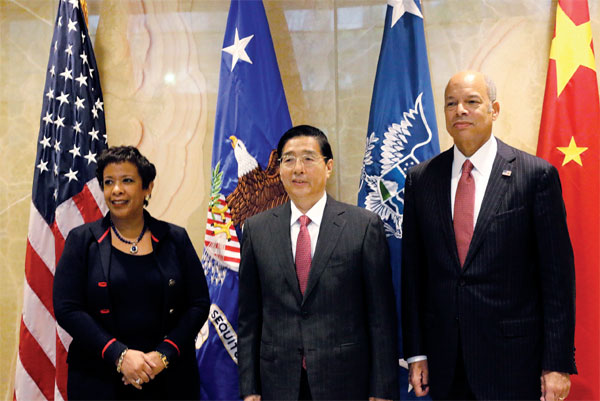Consensus reached on cybercrime
China and the United States reached an important consensus on fighting cybercrimes at the first round of high-level dialogue on the issue in Washington on Tuesday.
The two sides agreed on a guiding principle for fighting Internet crimes and related issues. They agreed to set up a hotline mechanism; determined a number of cases for cooperation in cybersecurity; reached more consensus on cyber counter-terrorism cases and bid to strengthen their capacities to battle electronic crime.
The hotline would allow direct communications between officials from both sides, including ministerial and vice-ministerial-level officials, on important and emergent cases.
Both sides agreed to hold law enforcement training for the other side in 2016. In the first half of next year, the Chinese side will provide a 10-day training course for 15 US law enforcement personnel in Beijing.
The Chinese side also proposed to hold a cyber counterterrorism symposium in China in the first half of next year. Internet giants such as Google and Facebook are expected to be invited to participate.
The talk on Tuesday was co-chaired by China's State Councilor Guo Shengkun, US Attorney General Loretta Lynch and US Secretary of Homeland Security Jeh Johnson.
China has sent seven ministerial-level officials to show its sincerity for better cooperation between the two countries. They include officials from the Party Central Political and Legal Affairs Committee, Ministry of Public Security, Ministry of State Security, Ministry of Justice, Ministry of Foreign Affairs and the State Internet and Information Office.
The meeting came less than two months after important commitments on the cyber issue by President Xi Jinping and President Barack Obama during Xi's state visit to the US in September.
Bilateral relations had been seriously strained before Xi's visit in no small part because of growing tension on cybersecurity.
Guo said on Tuesday that the two leaders had reached an important consensus on the matter during Xi's state visit. Xi and Obama also talked about China-US cyber cooperation on Monday, when they met during the UN Climate Conference in Paris.
"China and the US have important shared interests in ensuring cybersecurity and are fully capable of turning their differences and frictions into bright spots for cooperation," Guo said.
He emphasized the importance of talking to earnestly implement the consensus of the two leaders.
Guo noted that China-US law enforcement cooperation in cybersecurity has entered a new stage. Practical cooperation and candid exchanges have helped solve some concrete issues and boost mutual understanding and trust.
"The Chinese side is willing to join hands with the US side to build a cooperative and win-win cybersecurity law enforcement-cooperation mechanism based on the principle of rule of law, equality, frankness and pragmatism," he told the US delegation.
Guo called on the two sides to effectively respond to each other's concerns in a timely manner and to manage their differences constructively.
According to Chinese officials at the meeting, both Lynch and Johnson said that the US and China, as the world two largest economies, have common interests on cybersecurity.
They said the US side is willing to implement the consensus reached by the two heads of state in a candid and constructive way.
Lynch and Johnson stressed that the two sides should strengthen information exchange, and partner on fighting cyber terrorism and the theft of commercial secrets and promote dialogue.
The new high-level talks will be held twice a year, with the second round scheduled for Beijing in June 2016. Both Lynch and Johnson have been invited to attend the dialogue.
The two countries have stepped up their cooperation recently.
Meng Jianzhu, secretary of the Party Central Political and Legal Affairs Committee, paid a quick visit to the US from Sept 9-12 to get a better handle on the growing cyber tension ahead of Xi's state visit.
During Xi's visit, China and the US agreed to increase law enforcement communications regarding malicious cyber activities, including breaches of sensitive information, and to provide timely responses to requests for information and assistance concerning those activities. Both sides also agreed to provide updates to the other side on the status and results of those investigations and to take appropriate action.
The two leaders also agreed that neither government would conduct or knowingly support cyber-enabled theft of intellectual property, including trade secrets or other confidential business information, with the intent of providing competitive advantages to their countries' own companies or commercial sectors.
On Nov 12 in Beijing, Meng and Guo met with visiting US Deputy Homeland Security Secretary Alejandro Mayorkas and his delegation to discuss cooperation in combating cybercrimes and to prepare for the talks in Washington.
The Washington Post reported on Monday that US officials witnessed a decline in cyber hacking of US companies via China in the past year.
Both Chinese and US leaders have hoped that the issue will be better managed and not spill over to harm the nations' overall relationship.
chenweihua@chinadailyusa.com
|
State Councilor and Minister of Public Security Guo Shengkun (center), US Secretary of Homeland Security Jeh Johnson (right) and US Attorney General Loretta Lynch pose for a photo on Tuesday morning in Washington ahead of the first round of high-level dialogue to fight cyber crimes following the signing of a bilateral anti-hacking accord in September during President Xi Jinping's state visit to the US. The two countries hope a better cooperation in cyber security and a better management of their differences could help the overall bilateral relations. Chen Weihua / China Daily |



















